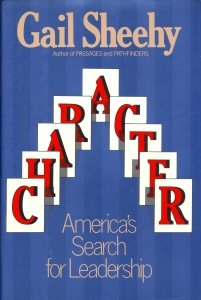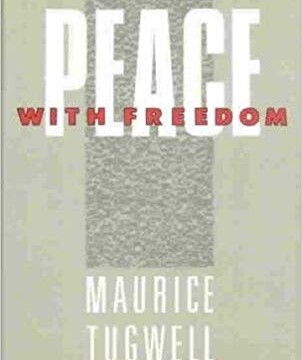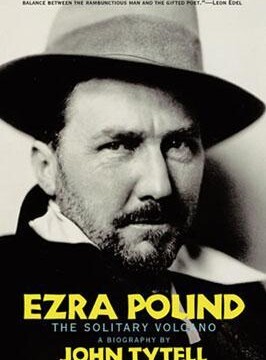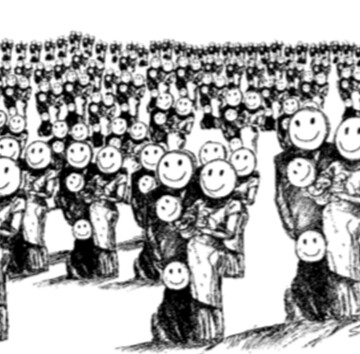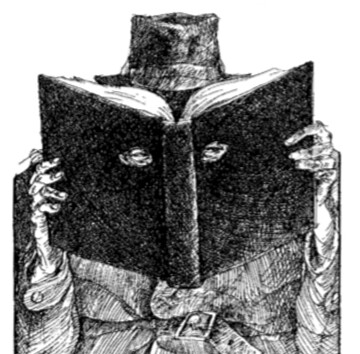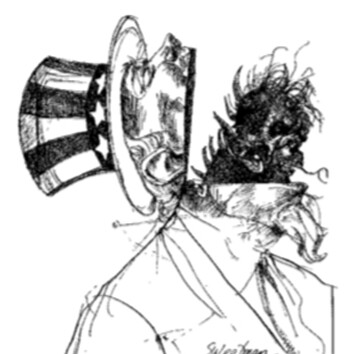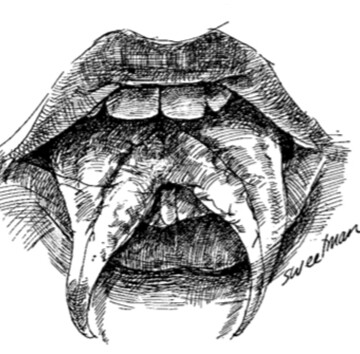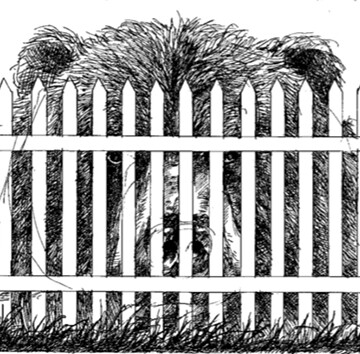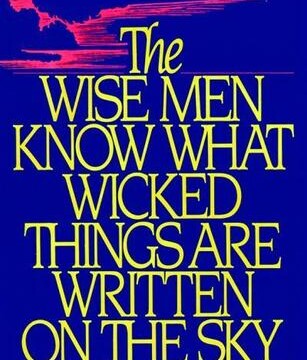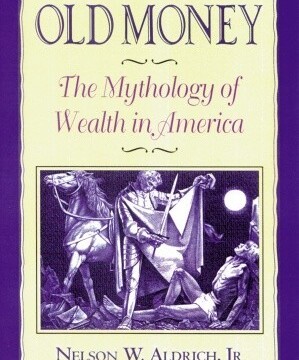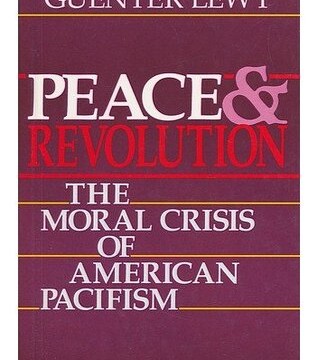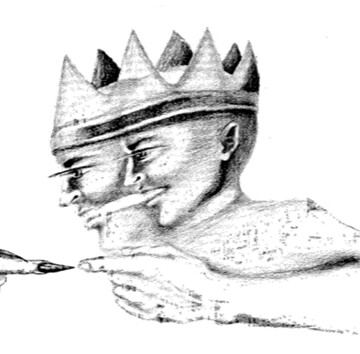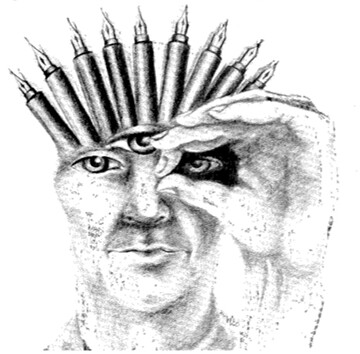In Twin Powers, Thomas Molnar, one of our age’s most imaginative and creative thinkers, confronts us, like Hannah Arendt and Eric Voegelin before him, with an analysis of our social, political, and cultural situation that is both fascinating and frustrating: fascinating, because it seems to explain so much; frustrating, because it appears very difficult to...
Category: Reviews
Old Possum in his Letters
“Talent is an adornment; an adornment is also a concealment.” —Nietzsche “I think one’s letters ought to be X about oneself (I live up to this theory!)—what else is there to talk about? Letters should be indiscretions—otherwise they are simply official bulletins.” So T.S. Eliot remarked to his Harvard classmate, the poet Conrad Aiken, in...
Says Who?
During the long election season just past, Gail Sheehy wrote for Vanity Fair a series of “character profiles” of various presidential candidates. Six of those profiles, together with an introductory essay and a long piece on Ronald Reagan, make up Character: America’s Search for Leadership, Ms. Sheehy’s latest book. In addition to Reagan, her subjects...
Weighing Freedom
This yearbook, prepared by Freedom House—a private nonprofit foundation from New York—is the tenth in the series of annual comparative surveys of political and civil liberties in the world. Started in 1972, the Freedom House project to assess the status of freedom around the globe has become an indispensable gauge for anyone interested in the...
Tell Them What They Want to Hear
Unremarked by commentators on Canada’s federal election last November was the performance of candidates for the Communist Party of Canada. To qualify for national status, a party must field candidates in 50 ridings, which the CPC manages to do despite a singular lack of voter support. Out of some 13 million votes cast, the CPC...
Madness in Great Ones
The American poet and man of letters John Berryman created in his half-memoir, half-short story “The Imaginary Jew” what is very likely the most powerfully compressed vision of vulgar, visceral racism in our literature. In this present, honorably intended biography of Ezra Pound by an apparently Jewish and leftist professor at Queens College (whose previous...
The Lessons of Grenada
“To conquer tumult, nature’s sodin force, War . . . was first devis’d.” —Sir William D’Avenant Grenada’s Communist interlude has become the subject of an intense postmortem by scholars of varying ideological hues. Historically, the small island is destined to be a symbol of the Reagan years. However much the US intervention of October 25,...
National Insecurity
“Diplomacy is utterly useless where there is no force behind it.” —Theodore Roosevelt From the elevation of arms control to the opening of talks with the PLO, the course of American foreign policy in recent years has led some to wonder why Ronald Reagan was once considered such a contrast to Jimmy Carter. The cycle...
Burned but Never Consumed
The first writer known to have made the outrageous accusation of ritual cannibalism against the Jews was a pagan Greek named Apion. But it was the Christians who established prejudice against and hatred for Jews as a fixture of Western civilization. The Christians’ animus against the Jews derived from the idea that “the Jews” had...
Bad Georgie
The facts of George Garrett’s literary career are laid out in the bibliography here: his 24 books include novels, plays, and collections of poems and short stories. In addition he has served as editor of 17 other books—interviews with contemporary writers, literary criticism, books on film scripts. He has also written a biography of the...
Prodigal Son
“Children begin by loving their parents. After a time they judge them. Rarely, if ever, do they forgive them.” —Oscar Wilde Louis Simpson stands as an easy example of the poet divided, whose best talents and strongest predilections are at odds with one another. He takes Walt Whitman as spiritual father and his relationship with...
Reading, Writing, ‘Rithmetic and War
Twenty-five years ago when I was a schoolteacher in an Afghan mountain valley I came across a book by an English pedagogue called Teaching English Under Difficult Circumstances. I was reminded of that title as I read this informative monograph by Middle East commentator Antony Sullivan. His short book might have been subtitled, “Teaching the...
The Deconstructive Lyric
“Poetry is certainly something more than good sense, but it must be good sense . . . just as a palace is more than a house, but it must be a house.” —Samuel Taylor Coleridge Margaret Atwood writes in her poem “Mushrooms”: Here is the handful of shadow I have brought back to you, this...
A Way Out
Discussions of the future of apartheid generally assume that South Africa must remain a homogenous “unitary state.” This assumption not only presents a paralyzing dilemma (either democracy or apartheid), but also a prescription for continued social turmoil, if not outright civil war. A unitary state is a “winner take all” state—if there are indeed only...
Blood Relations
In 1840, when Edgar Allan Poe wrote the first modern detective story, “The Murders in the Rue Morgue,” an unsuspecting public scarcely realized it was witnessing the birth of a new genre that would actually become the most ecumenical of all literary forms. Since Poe’s time, the detective story has flourished among readers of every...
A More Perfect Union
In Pursuit is a philosophical exegesis on what is wrong with contemporary social policy analysis. In some ways it is a sequel to Murray’s Losing Ground, having much in common with Part IV (Rethinking Social Policy) of that influential book. Though this is a more enterprising work, it is also a less successful one, leaving...
A Prince of Our Disorder
“Very few care for beauty; but anyone can be interested in gossip.” —C.S. Lewis In 1982 The Village Voice published an article accusing the famous Polish emigre writer Jerzy Kosinski of being a fraud. The authors (Geoffrey Stokes and Eliot Fremont-Smith) argued that Kosinski’s novels had all received extensive and unacknowledged “help” from various editorial...
The Southern Myth
Andrew Lytle and Allen Tate, two of the original Vanderbilt Agrarians, maintained a remarkable friendship spanning some half a century, from the early 20’s until Tate’s death in 1979. While both pursued prolific literary careers, their paths crossed less frequently, particularly as Tate became identified with modernist poetry and criticism in the Eliot tradition. Lytle,...
Recreating the Epic
“And the Lord God formed man of the dust of the ground and breathed into his nostrils the breath of life; and man became a living soul.” —Genesis 2.7 The 19th century had an unfortunate passion for novels in verse. I have tried to read some of the more celebrated, notably Elizabeth Barrett Browning’s Aurora...
The City of Man—Texas Style
We all know something of cities that thrived once and then for one reason or another ceased to exist—preclassical cities we read about in myth and epic; Homer’s Troy or St. Paul’s Ephesus. So used are we to thinking of these extinct places as ancient and, therefore, remote, that it is hard to conceive, as...
Violence and the Subversive
Terrorism has been a plague for Western democracies over the past decade, but in France and Britain it has not been a fatal disease. Other countries have not been so lucky. The Tupamaros of Uruguay took a country that, with all its problems of inflation and corruption, enjoyed 90 percent literacy, low infant mortality, and...
Piping Hot
Concocted by four editors of something called Equator magazine (I am told it is a large glossy tabloid of odd people doing odd things), Hot Type‘s subtitle is: “Our Most Celebrated Writers Introduce the Next Word in Contemporary American Fiction.” On the basis of the writing selected, I don’t know if I would let some...
Intellectual Operator
It is a distinct possibility that we leave to posterity writers and works from which the future curious will conclude that this century was the stupidest, most verbose and obscene, altogether the worst in the historical record. What else can you say of a century that elected Michel Foucault as one of its mâitres à...
A Literary Proctology
“My goal from the beginning,” states Caldwell, “was to be a writer of fiction that revealed . . . the inner spirit of men and women as they responded to the joys of life and reacted to the sorrows of existence.” The conclusion, however, of what he sought to achieve “with all my might” is...
Inspiration and Craft
“Take these two books,” is an entirely arbitrary prompting by an editor who happened to have them around on a shelf. Willy-nilly, here they are together, and one looks at them, shuffling through the poems, some familiar and some not. And there is a moment when the rightness of the conjunction seems wonderful! A piece...
Ahistorical Admonitions
“One age cannot be completely understood if all others are not understood. The song of history can only be sung as a whole.” —Ortega y Gasset In The Politics of Human Nature, Thomas Fleming has boldly undertaken to delineate a system of natural politics. A classicist by training, Fleming believes that “the collapse of Roman...
The Secular Imagination
Under the tyranny of ideology that is a grim fact of contemporary life in university English departments, it is tempting to reflect on the career of Lionel Trilling (1905-1975) with an uncritical wistfulness. It is to Stephen Tanner’s credit that his astute and balanced introductory study resists such a temptation; for however much Trilling’s criticism...
An American Burke
John Randolph (1773-1833) survives in America’s footnotes as a colorful contrarian, and the Gore Vidal school of historiography pants at his duel with Henry Clay and his taste for opium. A master rhetorician, he left a long list of choice barbs, nearly all concocted on the spur of the moment. James Kilpatrick characterized the errant...
Transylvanian Tales
“Tyrants are always assassinated late; that is their great excuse.” —Cioran It is no surprise that there are a number of mysteries about this book. The author was the deputy director of the Romanian Foreign Intelligence Service; for reasons that he does not care to explain, he defected to the USA in July 1978. Was...
Beyond Moral Equivalency
“The triumph of demagogies is short-lived. But the ruins are eternal.” —Charles Peguy Jeane Kirkpatrick has given us two useful ways to think about that segment of the American intelligentsia that continuously finds fault with virtually everything this country does: they are the “blame America first” crowd and the believers in “moral equivalency.” After reading...
Prayer by Numbers
When sociologists look at religion, what do they see? Inevitably, they see statistical clusters of churchgoers sorted through ecclesiastical, geographic, and demographic grids. People who want to assess contemporary social trends in American religion would do well to consult this new volume by Rodney Stark and William Sims Bainbridge. In impressive detail. Stark and Bainbridge...
No Hope for the Homeless
This book is a 272-page inventory of Mother Hubbard’s cupboard. Almost without exception, the contributed articles treat the homeless as some vague, faceless group, far distant from the authors’ time and place. There is not even the degree of passion an astronomer brings to the study of Jupiter’s rings. You get the feeling that you...
The House of David
Descent from a Founding Father is a matter for celebration to thousands of sons and daughters of the American Revolution and members of the Cincinnati Society, Colonial Wars, First Families, and other sufficiently remote or proud groups. Americans are eager to claim, when they can, ancestry made noble by history if not by “blood.” The...
Tradition and Justice
“We have forgotten the origin of morality in fact and circumstance.” —Wendell Berry Alasdair MacIntyre is our most relentless tracker of the crisis of the liberal regime. In After Virtue, he recounted the history of the triumph of “emotivism” in ethics. In Whose Justice? Which Rationality? he has begun the process of pointing the way...
Why Italy Runs
Americans find Italy a paradox. We love vacationing in a country with such delicious food, friendly people, and so many historical and cultural monuments. Its politics, however, bother us. After 20 years of one party rule, from 1923-43, it seemed to rebound into virtual chaos. There have been 46 governments since World War II, not...
Socialism and Reality in Central America
“It is good also not to try experiments in states.” —Francis Bacon As a term, imperialism underwent a number of visions and revisions at the turn of the century when the fact itself was receding. There was Bernard Bosanquet’s British interpretation and, in France, the Baron de la Seilliere’s multivolume opus. Such were radically redefined...
Worshiping the Golden Self
Are religion and psychology enemies or allies? Can religion and psychology peacefully coexist? Can religion and psychology work together for the sake of social progress? Man and Mind, an anthology of thought-provoking essays, seeks to provide answers to these questions. The essayists are united in their conviction that most modern psychologists consider psychology a good...
Enduring Wisdom
Wise Men is a collection of 11 lively essays by the wise old sage who is contemporary conservatism’s most able prophet. The Kirk neophyte will find these essays most alluring; it is unusual to experience such an affirmation of the “permanent things” in our current age. The Kirk devotee will find this slim volume to...
Opposing the Disneyfiers
Paul Fussell’s enemies are “habitual euphemizers, professional dissimulators,” and the “Disneyfiers of life.” He is in favor of cojones, which is why he ends up in one of his essays liking the Indy 500 in spite of himself, comparing it favorably to the violence of the Falklands War, which is going on while he watches...
The Dinosaur
Lewis was fond of referring to himself as an Old Western Man, one of a soon-to-be-extinct species: a veritable dinosaur. As a classically educated member of the Anglo-Irish middle class, one born at the turn of the century, his opinions to most modernists must certainly appear Paleolithic. He was not a political man, seldom read...
Interpreting Burke
Father Francis P. Canavan, S.J., with the publication of this his second book on Edmund Burke, clearly establishes himself as one of the most—if not the most—able interpreter of Burke’s political philosophy. Here Canavan focuses upon topics of enormous import for fathoming Burke’s political philosophy, including theological influences on Burke, his religious faith, the relationship...
Surviving College 101
Hugh Hewitt’s First Principles is a 125-page manual on how to handle the cacophony of illiberal thought that flourishes in our universities. Consider the experience of one prominent victim, Amy Carter. The freckle-faced little girl who once stood at the knee of the President of the United States has become a self-described “feminist-socialist” in the...
Children of Fortune
“Each social class has its own pathology.” —Proust Going by the tide and subtitle alone, it would appear that this is either a book about the lies rich people tell each other, or a book transforming the jingle of coins into the crash of magical cymbals. Having read it through, I am happy to report...
Common Sense
Over in my philosophy department they used to shake their heads and smile. They didn’t actually pat me on the head or anything; professors don’t do that. But they did get a kick out of what they saw as my naiveté. “How sweet,” they seemed to think, “that he could really believe that philosophy is,...
Princelings of Peace
“While at one time pacifists were single-mindedly devoted to the principles of nonviolence and reconciliation, today most pacifist groups defend the moral legitimacy of armed struggle and guerrilla warfare, and they praise and support the communist regimes emerging from such conflicts.” This is the thesis of Guenter Lewy’s study of the most enduring and successful...
The Impossibility of a Book
Andrei Bitov graduated from the Leningrad Mining Institute but chose to become a writer rather than a geologist. His new novel, Pushkin House (the second of his works translated into English), will probably share the “general acclaim” that greeted his short stories in Life in the Windy Weather, published a year ago. It is skillful...
The President’s President
“Politicians neither love nor hate. Interest, not sentiment governs them.” —Chesterfield Richard Nixon’s second term as president ended over two years early with his resignation on August 9, 1974. Someday, when President Reagan’s papers and telephone logs are made public, I think they will reveal that Nixon completed his presidential term in the second Reagan...
Crackers & Roundheads
“The Celt in all his variants from Builth to Ballyhoo His mental processes are plain—one knows what he will do, And can logically predicate his finish by his start.” —Kipling Despite all that has passed since, the Civil War is still at the center of American history. No one has ever doubted this in the...
Molder of America
Nineteenth-century America was an explosively creative country. It opened up new territories to cultivation and poured forth a cornucopia of technical inventions. Its literature ranged from Hawthorne to Mark Twain, from Whitman to Stephen Foster, and its art included the architecture of McKim, Mead and White and the sculpture of Augustus Saint-Gaudens (1848-1907). Saint-Gaudens’s was...
No Water in the Wine
Stanley Jaki, a Catholic priest and a prolific historian of science, has produced a series of scholarly, at times plodding, essays derived from lectures he delivered at Notre Dame. It purports to be the first full treatment of Chesterton and science. He offers us a fair picture of the intuitive genius of Chesterton, whose common...
